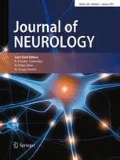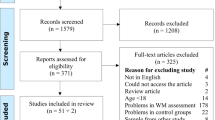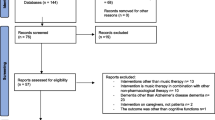Abstract
Background
Cerebral small vessel disease (cSVD) is a leading cause of cognitive impairment in the elderly. Despite cSVD cognitive profile is thought to be mainly characterized by attention and executive functions deficits, there is no definite agreement on the standards for its evaluation. This systematic review aims at identifying cognitive domains and neuropsychological tools specifically chosen in the assessment of cognitive impairment related to cSVD, and the temporal and geographic trends in their utilization.
Methods
Following PRISMA guidelines, original articles focused on cSVD patient samples neuropsychologically evaluated were searched using PubMed, Scopus and PsycINFO databases without language or time restrictions (PROSPERO registration number CRD42018089882; date 27-02-2018).
Results
We screened 13,688 studies and included 298 in the qualitative data synthesis. Global cognitive functioning and attention/executive functions were the most evaluated domains (87% and 69%, respectively). Mini Mental State Examination was the most used screening tool (73%), followed by MoCA (14%) whose utilization rapidly increased over the last years. The most frequently used second level tests were phonemic and semantic fluencies (39% and 30%, respectively), Trail Making Test (TMT) part A and B (31% and 32%, respectively), Stroop (31.5%), and Boston naming (30%). All tests resulted stably utilized over time, except for semantic fluency and Stroop whose use increased. Phonemic fluency and Boston naming were the most used in North America (51% and 45%, respectively), TMT in Europe (43%), and Stroop and semantic fluency in Asia (43% and 40%, respectively).
Conclusions
This systematic review confirms that attention/executive functions domain is the most commonly evaluated in cSVD together with lexical retrieval abilities based on executive control processes. Temporal and geographic variability emerged in the choice of tests.
PROSPERO registration number
CRD42018089882 (27-02-2018).






Similar content being viewed by others
Availability of data and materials
The data that support the findings of this study are available on request from the corresponding author.
References
Rensma SP, van Sloten TT, Launer LJ, Stehouwer CDA (2018) Cerebral small vessel disease and risk of incident stroke, dementia and depression, and all-cause mortality: a systematic review and meta-analysis. Neurosci Biobehav Rev. https://doi.org/10.1016/j.neubiorev.2018.04.003
O’Brien JT, Erkinjuntti T, Reisberg B, Roman G, Sawada T, Pantoni L et al (2003) Vascular cognitive impairment. Lancet Neurol 2:89–98
Pantoni L (2010) Cerebral small vessel disease: from pathogenesis and clinical characteristics to therapeutic challenges. Lancet Neurol 9:689–701
Chabriat H, Joutel A, Dichgans M, Tournier-Lasserve E, Bousser MG (2009) Cadasil. Lancet Neurol 8:643–653
Salvadori E, Pantoni L (2020) The role of the neuropsychologist in memory clinics. Neurol Sci. https://doi.org/10.1007/s10072-020-04253-4
Moher D, Shamseer L, Clarke M, Ghersi D, Liberati A, Petticrew M et al (2015) Preferred reporting items for systematic review and meta-analysis protocols (PRISMA-P) 2015 statement. Syst Rev. https://doi.org/10.1186/2046-4053-4-1
Wardlaw JM, Smith EE, Biessels GJ, Cordonnier C, Fazekas F, Frayne R et al (2013) Neuroimaging standards for research into small vessel disease and its contribution to ageing and neurodegeneration. Lancet Neurol 12:822–838
Hachinski V, Iadecola C, Petersen RC, Breteler MM, Nyenhuis DL, Black SE et al (2006) National Institute of Neurological Disorders and Stroke-Canadian Stroke Network vascular cognitive impairment harmonization standards. Stroke 37:2220–2241
Funding
This research did not receive any specific grant from funding agencies in the public, commercial, or not-for-profit sectors.
Author information
Authors and Affiliations
Contributions
All authors contributed to the study conception and design. Material preparation, data collection and analysis were performed by ES, MB and IC. The first draft of the manuscript was written by ES, MB and LP and all authors commented on previous versions of the manuscript. All authors read and approved the final manuscript.
Corresponding author
Ethics declarations
Conflicts of interest
The authors declare that they have no conflict of interest.
Electronic supplementary material
Below is the link to the electronic supplementary material.
Rights and permissions
About this article
Cite this article
Salvadori, E., Brambilla, M., Cova, I. et al. Cognitive evaluation in cerebral small vessel disease: towards an evidence-based identification of the reference standards. Part 1. A systematic review and qualitative data synthesis. J Neurol 268, 4563–4572 (2021). https://doi.org/10.1007/s00415-020-10262-2
Received:
Revised:
Accepted:
Published:
Issue Date:
DOI: https://doi.org/10.1007/s00415-020-10262-2




